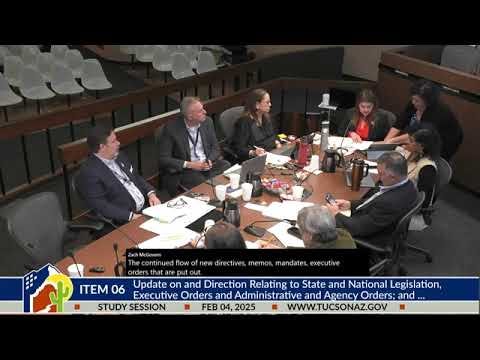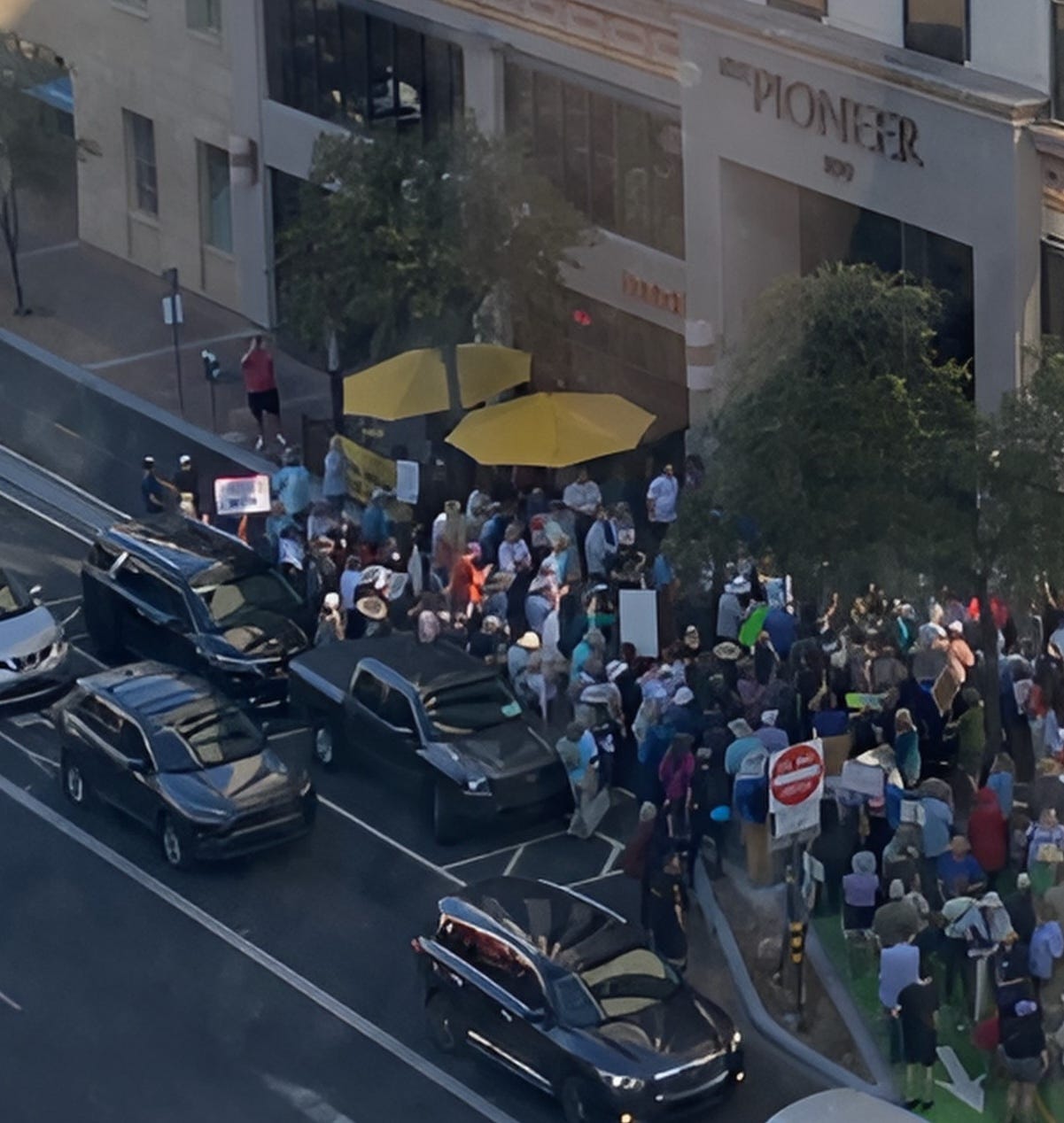Romero talks Trump
City pushes back … Prop 414 gets a drubbing … And that looks like a bait and switch.
Southern Arizonans have been waiting for weeks to see how elected Democrats would respond to the onslaught of executive orders, memorandums, and statements coming out of the White House.
On Tuesday night, Tucson Mayor Regina Romero finally weighed in, saying actions taken by President Donald Trump and his cabinet over the last few weeks have created “a lot of panic and concern” inside Tucson City Hall.
“I just want to reassure Tucsonans that we are being vigilant in examining any items that are coming down from the Trump White House and the impact that they might be having on Tucsonans and our ability as a city to provide services to our community," Romero said at Tuesday’s City Council study session.
Romero, along with the rest of the Council, backed up those statements with action, giving City Attorney Mike Rankin the authority to file legal challenges (or more likely, join existing legal challenges) on behalf of the City of Tucson.
While so far the city has only filed an amicus brief challenging the Trump administration’s attempt to demolish birthright citizenship, the action on Tuesday is a practical solution – allowing Rankin to challenge other federal actions on the city’s behalf without having to wait and put it on a future Council agenda.
Councilman Paul Cunningham was supportive of the proposal, voicing his frustration with the chaos and uncertainties caused by the federal mandates.
"You cannot tell an agency 'Congratulations you are funded for four years’ and then call them back the next day and say ‘Oh, nevermind,'" Cunningham said.
Opposed to Prop 414: With the election for the half-cent sales tax measure election a little more than a month away, the Council on Tuesday night found stiff resistance from local activists opposed to the measure.
Their concerns are different from those made by the Tucson Metro Chamber of Commerce Comments and its allies. They’re not worried about the tax increase, rather, the group of residents is largely focused on what they see as misguided priorities when it comes to addressing the homelessness crisis. They are not wild about the idea that a huge chunk of the roughly $800 million generated over a decade would go to law enforcement.
Many focused on the roughly $16 million that will be set aside to upgrade the Tucson Police Department’s tiny fleet of aircraft, including looking to replace one of its aging helicopters with a new plane.
So what do the residents want? More affordable housing, more resources for the homeless, pay equity for union members working at the City of Tucson, and generally, a lot less money going to police.
One less place to buy beer: If the City of Tucson has any say in the matter, a new gas station across the street from Salvation Army Hospitality House at Speedway and Main won’t be selling tall boys.
The Council rejected a liquor license request for a Shell Gas station after several neighborhood groups complained.
The vote to deny the request was unanimous, but the Arizona Department of Liquor Licenses and Control Board will likely have the final say on whether the business can sell alcohol.
Occasionally, the state liquor board has sided with private businesses over the city’s objections.
Tucson House renovations greenlit: The Council also signed off on a $188 million renovation of a 1960’s era public housing complex off of Oracle Road known as Tucson House.
The 30-month planned renovation of the city’s largest affordable housing complex will not displace anyone, city officials told the Council. The city plans to move displaced families into other city-owned properties.
It seems nearly impossible to explain how municipal budgeting works without a long presentation full of charts and graphs.
But in about two and a half minutes, Tucson City Manager Tim Thomure manages to break down how little discretionary spending the city has in its $2.4 billion annual budget.
Kudos to him! We could all use more quick doses of budget nerdery.
The Tucson City Council is fighting several bills making their way through the Legislature. It’s an annual exercise.
Thanks to our legislative tracking service, Skywolf, paid subscribers to the Tucson Agenda can be as up-to-date on bills as the Council.
Here is a sampling of the bills keeping your city council up at night:
HB2371/SB1229: Sponsored by Republican Rep. Leo Biasiucci and Republican Sen. Shawnna Bolick. The bills, which are identical, would bar municipalities from interfering with home buyers' rights to choose home features, floor plans, and designs, and restrict requirements for shared amenities, screening, private streets, and specific design elements.
It would limit municipal authority on minimum lot sizes, building setbacks, and architectural standards for single-family homes, except in historic districts. Applicable to developments constructed after the effective date, with certain exemptions for tribal lands and areas near military airports.
Tucson opposes both bills.
SB1164: Sponsored by Republican Senate President Warren Petersen. The bill would require law enforcement agencies in Arizona to enter into agreements with federal immigration authorities to enforce federal immigration laws, including training at least 10 percent of officers to implement these agreements. It would also mandate cooperation in detaining individuals under federal immigration detainers.
Tucson opposes the bill.
SB1268: Sponsored by Republican Sen. Wendy Rogers. The bill would require hospitals accepting payment from the Arizona Health Care Cost Containment System to include a section on patient admission forms for individuals to indicate their citizenship or immigration status, followed by a statement on the form that their responses will not impact their care or be reported to immigration authorities.
Hospitals would be required to submit quarterly reports to the Arizona Department of Health Services (AZDHS) detailing patient responses regarding immigration status and annually report aggregate data on uncompensated care costs for patients not lawfully present in the U.S., including the impact on hospital services and funding needs. AZDHS may establish rules for data submission but may not require personal identifying information.
Tucson officials are keeping an eye on that one.
Paid subscribers can see the full list of bills the Tucson City Council is tracking in the footer at the bottom of this email. Not a paid subscriber? Upgrade today!
Ommmmmmmmmm…let’s rock!: The former Benedictine Monastery on North Country Club Road will be Tucson’s newest concert venue, the Arizona Daily Star’s Cathalena Burch reports. The former monastery, which for a time was a hub for local efforts to support asylum seekers several years ago, will soon be a 500-seat venue known as La Rosa.
Trying to stop Musk: Protestors gathered outside of Sen. Mark Kelly’s office in Tucson on Wednesday, asking him to “stop” Elon Musk after Musk gained access to sensitive federal data, including the U.S. Treasury Department’s payment system. Kelly wrote a letter to the White House yesterday saying he wanted answers from Musk. He said there was “real concern they’ve put national security at risk.”
Gitmo-bound: The Trump administration has started flying migrants to Guantánamo Bay, the military base in Cuba, the New York Times reports. The U.S. government has held migrants stopped at sea at Guantánamo, but this is the first time they’ve flown migrants from the interior of the United States. Officials say they have readied 30,000 beds. Mexico’s Foreign Affairs Secretary Juan Ramon de la Fuente said “No Mexican is going to go there under any circumstances,” KJZZ’s Nina Kravinsky reports. Instead, Mexican officials are setting up shelters at the border to receive Mexican citizens who are deported. As for asylum seekers who didn’t make it into the U.S. before the Trump administration shut down asylum appointments at the border, some of them are deciding to stay in Nogales, Sonora, rather than return to their dangerous home states or countries, Arizona Public Media’s Danyelle Khmara reports.
Trading places: Two lawmakers in Cochise County plan to switch places next year, the Herald/Review’s Terri Jo Neff reports. Republican Rep. Lupe Diaz and Republican Sen. David Gowan in Legislative District 19 filed statements of interest to run for each other’s spots. Gowan, who was first elected to the Legislature in 2008, hit his term limits in the House in 2016 and is now termed out of the Senate. But term limits are basically meaningless since lawmakers can keep switching from chamber to chamber to avoid them.
The Pima Democratic Party sent out an eye-catching email this week asking what happened to a giant photo of Congressman Mo Udall and President John F. Kennedy that used to hang in the old party headquarters.
They have it, but ….
“Unfortunately age hasn't been kind to the portrait and we need your help to get it restored,” the party wrote.
The email linked to a page to buy tickets for the Udall Dinner, which starts at $150 a ticket.
There is also a “Hifalutin” option at $10,000 for their annual fundraiser, which gets you a whole table at the dinner and a bunch of VIP perks.
Which begs the question, couldn’t they just buy a new portrait instead?









I’m guessing SB1164 stands a good chance of getting the veto, if it makes it to the Governor’s desk (although these days it’s hard to say). I’d love it if we could get updates on this one.
I'm not seeing anything in the footer of the post where we can track the bills.